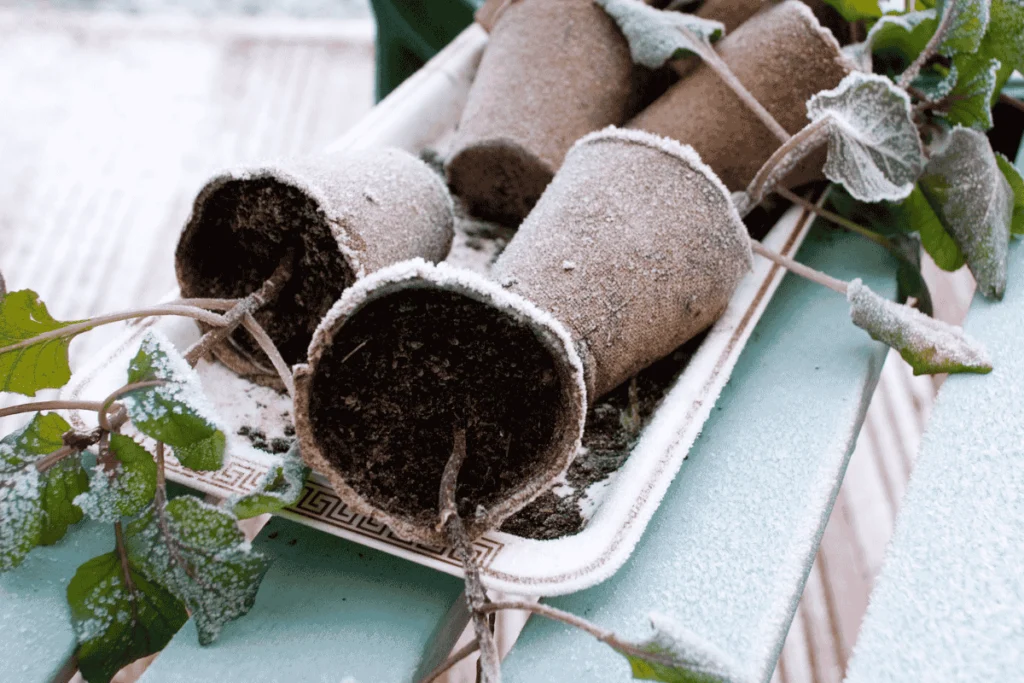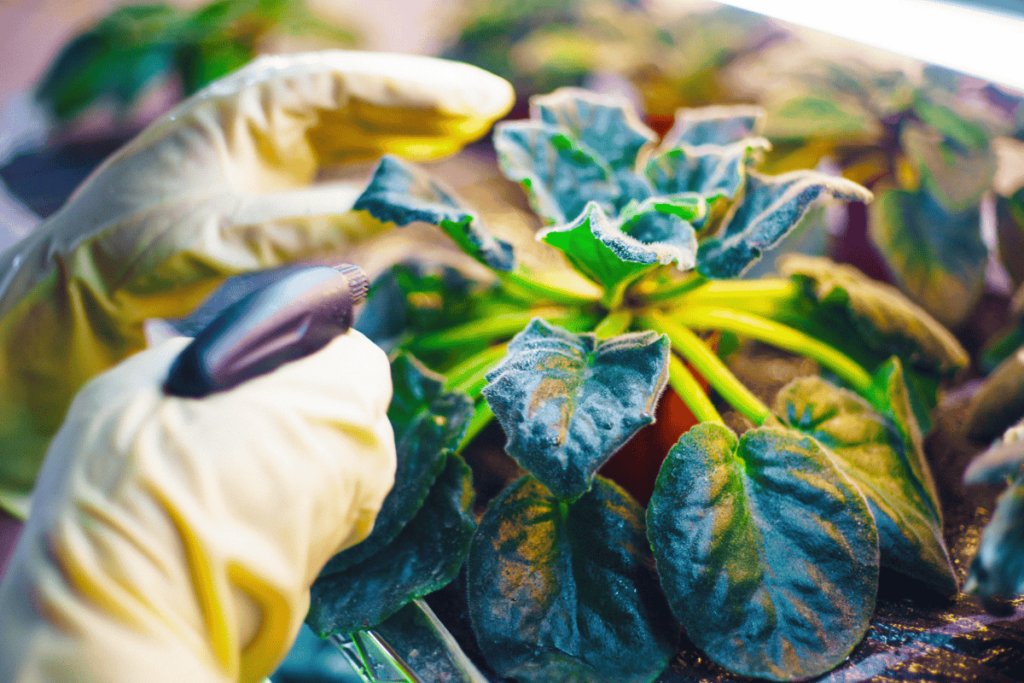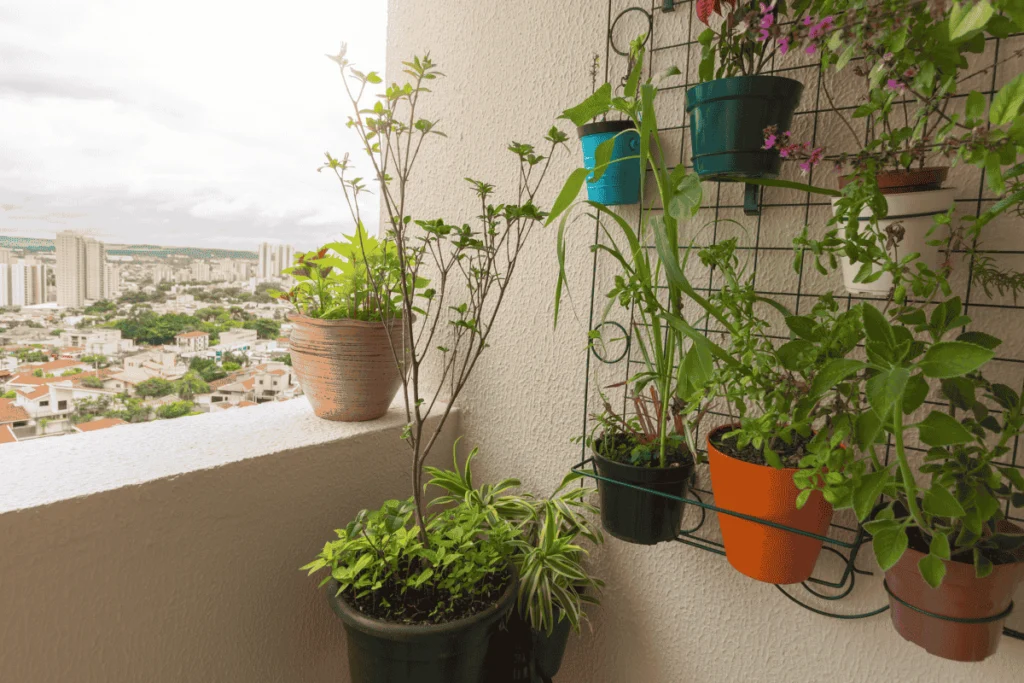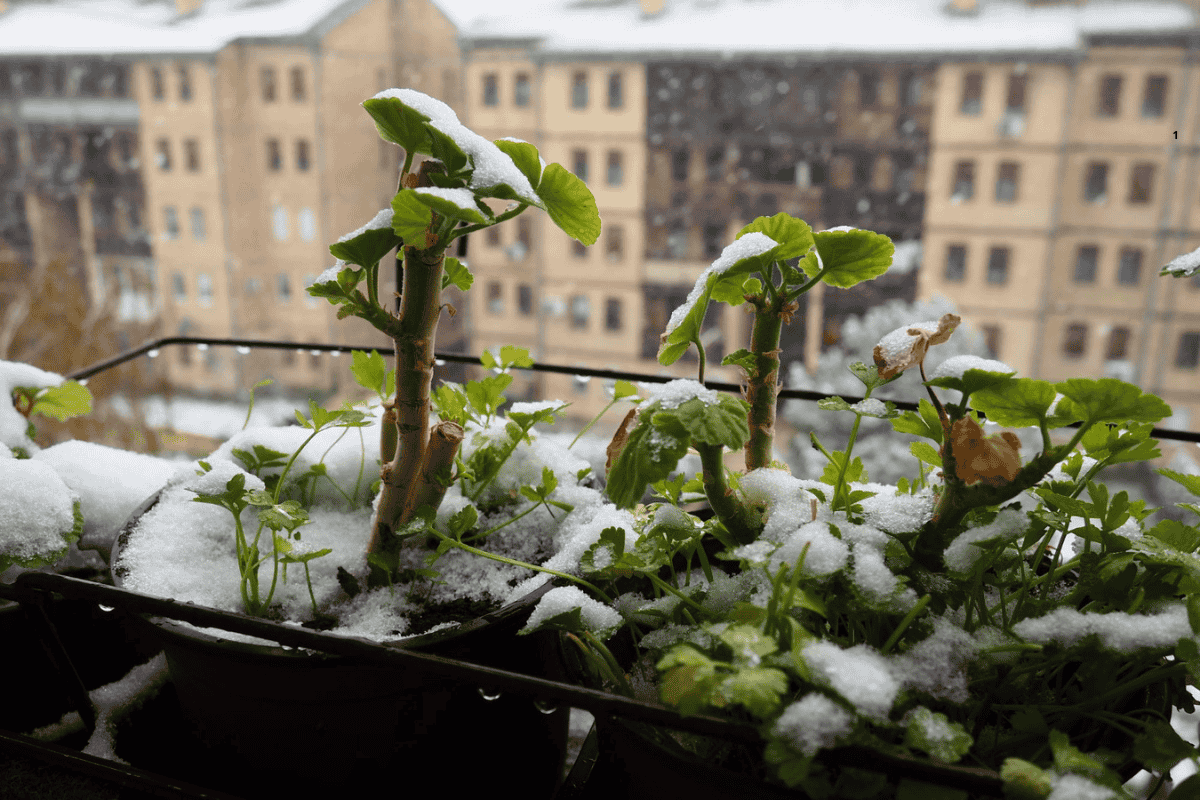Keeping your vertical garden healthy during winter can be challenging due to the cold temperatures and limited sunlight. However, with the right care and preparation, it’s entirely possible to keep your plants thriving.
In this guide, we’ll share expert tips for keeping vertical gardens healthy during winter, ensuring that your plants continue to grow strong and vibrant all season long. 🌱✨
Protect Plants from Frost and Cold Temperatures ❄️🛡️
One of the most important tips for keeping vertical gardens healthy during winter is to protect your plants from frost and freezing temperatures.
Move Indoor Gardens
Relocate portable vertical gardens indoors or to a sheltered area, such as a garage or greenhouse 🏡🌳.
Cover Outdoor Gardens
Use frost cloths, burlap, or floating row covers to shield plants from freezing temperatures. These coverings trap warmth and can prevent frost damage during the coldest nights. 🌬️❄️
Apply Mulch
Add a layer of mulch to regulate soil temperature and protect roots from extreme cold. Consider using organic mulches like straw or leaves, which provide extra insulation. 🍂🌾
Adjust Watering Frequency 💧
To maintain healthy growth in your vertical garden, it’s essential to follow the right watering schedule. These are crucial tips for keeping vertical gardens healthy during winter.
Reduce Watering
Plants need less water during winter due to slower growth rates. Watering too much during winter can result in root decay. 🌱⚖️
Check Soil Moisture
Always assess soil moisture levels before watering to avoid overwatering. Use a moisture meter to get accurate moisture level readings. 🌡️💧
Use Room-Temperature Water
For indoor plants, water with room-temperature water to prevent root shock. Cold water can cause damage to roots, especially in winter. 🌡️💦
Maximize Light Exposure ☀️
If you’re wondering how to maximize light exposure, one of the best tips for keeping vertical gardens healthy during winter is to place them near windows or use grow lights.
Want to learn more about growing your indoor garden during the winter months? 📺 Watch this step-by-step video tutorial on how to create a thriving indoor garden even when the weather is cold!”
👇 Watch Now: How To Grow an Indoor Garden During the Winter Months
Utilize Natural Light
Place indoor vertical gardens near south-facing windows to maximize sunlight. Position plants so that they receive as much light as possible throughout the day. 🏙️🌞
Clean Windows
Ensure windows are clean to allow maximum light penetration. Dirt or grime can block light from reaching your plants. 🧽✨
Supplement with Grow Lights
One of the most effective Tips for Keeping Vertical Gardens Healthy During Winter is to use LED grow lights in darker areas, ensuring plants receive enough light. LED lights can be energy-efficient and offer the right spectrum of light for growth during the winter months. 💡🌿
Choose Cold-Tolerant Plants 🥬❄️

If you’re looking for the best Tips for Keeping Vertical Gardens Healthy During Winter, choosing cold-tolerant plants is a great strategy to ensure survival during the colder months.
Select Hardy Varieties
Select plants like kale, spinach, parsley, and thyme for your vertical garden. These plants are more likely to survive the winter conditions. 🌱❄️
🌿 Looking for more ideas on which plants are perfect for shaded vertical gardens? Check out our guide on Best Edible Plants for Shaded Vertical Gardens to discover the best plants to grow in less sunny areas.
Add Winter-Flowering Plants
Consider pansies and violas for vibrant color during winter. These flowers can brighten up your vertical garden, even in the coldest months. 🌸🌷
Rotate Plants
Replace sensitive plants with cold-resistant varieties for better survival in low temperatures. 🔄🌱
Maintain Air Circulation 🌬️
Good airflow is crucial for plant health. One of the key Tips for Keeping Vertical Gardens Healthy During Winter is to prevent excess moisture, which can lead to mold and disease.
Promote Airflow
Ensure good airflow around plants to minimize the risk of mold and mildew. In indoor vertical gardens, consider using a fan to circulate air. 🌬️🌀
Avoid Overcrowding
Space plants adequately to prevent damp conditions that encourage disease. Overcrowded spaces can trap humidity, which may lead to fungal growth. 🌱🔲
Use Fans Indoors
A small fan can help circulate air in indoor spaces. Place it near your vertical garden to keep air flowing, especially in more humid indoor environments. 💨💡
Fertilize Sparingly 🌿
By using organic fertilizers, you follow essential Tips for Keeping Vertical Gardens Healthy During Winter while promoting strong root development.
Reduce Fertilization
Since plant growth slows in winter, cut back on fertilizing. Over-fertilization during the dormant months can stress plants. 🚫🌱
Use Organic Fertilizers
Provide a steady release of nutrients with organic options like compost, worm castings, or organic liquid fertilizers. 🌿💧
Focus on Soil Health
Enrich the soil with compost or worm castings instead of overfeeding plants. Healthy soil will better support plant growth even in the winter. 🌾🍂
Inspect for Pests 🐞🔍

Regular inspections are essential to prevent pests such as aphids, spider mites, and snails from damaging your vertical garden. These pests can thrive indoors during winter when plants are more stressed. 🐜🔬
🌿 For effective pest control strategies, check out our article on Vertical Garden Pest Control: Effective Strategies for a Thriving Garden to keep your plants healthy and pest-free.
Use Eco-Friendly Solutions
Manage pests with neem oil or insecticidal soap. These options are safe for most indoor and outdoor vertical gardens. 🌱🧴
Prune and Clean Up ✂️🧹

Remove Dead Growth
Trim dead leaves and stems to prevent disease and improve airflow. This will help your plants focus energy on the healthy, thriving parts. 🍂✂️
Shape Overgrown Plants
Prune plants to maintain their form and encourage healthy growth. Regular trimming keeps plants from becoming too leggy or unruly during the winter months. ✂️💚
Sanitize Tools and Containers
Clean and disinfect gardening tools and pots to reduce the risk of spreading plant diseases. Winter can be a time for disease buildup, especially if tools aren’t properly cleaned. 🧼🛠️
Monitor Humidity Levels 🌬️💧
Combat Dry Air
Indoor heating can create dry environments that stress plants. Use a humidifier near your vertical garden to maintain optimal humidity. 🌬️💧
Create a Microclimate
Group plants together to increase humidity naturally. The transpiration of plants will help raise humidity levels around the garden. 🌱🌧️
Provide Insulation for Outdoor Gardens ❄️🌾
Applying insulating barriers is among the best Tips for Keeping Vertical Gardens Healthy During Winter, as it helps retain warmth and protect roots from freezing temperatures.
Install Insulating Barriers
Use bubble wrap, foam panels, or insulating sheets on the back of outdoor vertical gardens to retain heat. 🧊🔧
Protect Soil and Roots
Apply straw, leaves, or wood chips as an extra layer of insulation to protect the soil and roots from freezing. 🍂🛡️
Shield Pots
Wrap pots with thick fabric, foam, or even old blankets to prevent cracking in freezing temperatures. 🧣❄️
Why Winter Care is Essential for Vertical Gardens ❄️🌱
Ensures Plant Survival: Protects plants from harsh weather conditions, ensuring they survive to thrive in the spring. 🌷🌞
Prepares for Spring Growth: Proper winter care sets the stage for robust growth when the weather warms up. 🌼🌱
Reduces Risks: Minimizes the chances of pests and diseases affecting your plants. 🐞🚫
Maintains Aesthetic Appeal: Keeps your garden functional and visually appealing, even in the colder months. 🎨🌿
Conclusion: Keep Your Garden Thriving All Year Round 🌟🌱

Caring for a vertical garden during winter may require some adjustments, but it’s entirely manageable with the right strategies.
By following these simple yet effective tips for keeping vertical gardens healthy during winter, you’ll ensure a vibrant and thriving garden all year round. 🌿❄️
Start winter-proofing your garden today and watch it thrive through the cold months! 🥶✨
FAQ: Frequently Asked Questions About Winter Care for Vertical Gardens ❓🌱
1. Can I still grow vegetables in my vertical garden during the winter?
✅ Yes! Winter doesn’t mean you can’t grow. Cold-hardy vegetables like kale, spinach, and lettuce thrive in cooler temperatures and can be successfully grown in vertical gardens during winter. 🌾❄️
2. How often should I water my vertical garden in winter?
✅ Water less frequently in winter. As plants are dormant and grow slower, they need less moisture. Always check the soil’s moisture before watering. 💧🌱
3. What types of plants should I include in my vertical garden for winter?
✅ Choose cold-hardy plants like parsley, thyme, kale, and spinach, as they’re more likely to withstand low temperatures. 🌿🥬
4. How can I prevent mold or mildew in my vertical garden during winter?
✅ Ensure adequate airflow and avoid overcrowding your plants. Use a small fan indoors to circulate the air and prevent excess moisture buildup. 🌬️🍃
🌟 Now that you know the best Tips for Keeping Vertical Gardens Healthy During Winter, start implementing these strategies today to enjoy a thriving garden all season long! ❄️🌿✨

